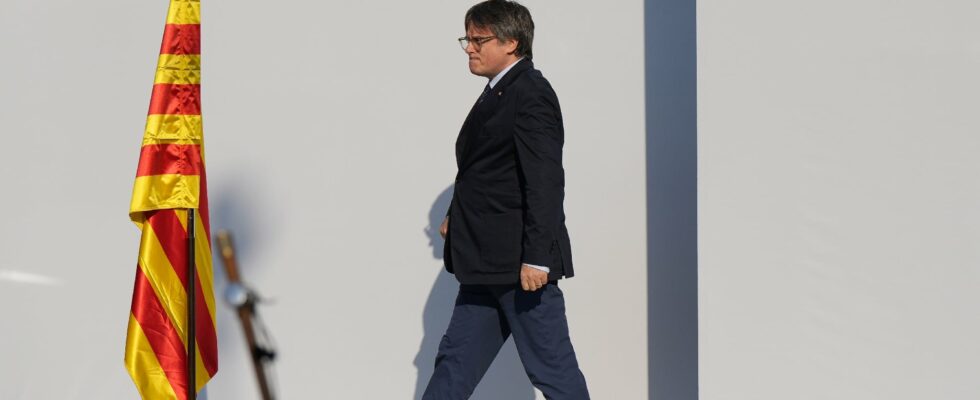He has not set foot there for nearly 2,475 days, according to Spanish journalist Cristina Rubio of the general daily The World. Carles Puigdemont fled Catalonia on October 29, 2017, two days after proclaiming the independence of the richest region of Spain, following a referendum deemed illegal by the federal state. He found refuge in Belgium, where he managed to be elected as a MEP in 2019, for one term. His seven years of exile were punctuated by two arrests, one in Germany and the other in Sardinia. Each time, he was released.
There he is, around nine o’clock this Thursday, in front of a gathering of a thousand supporters, accompanied by the independence activist Josep Rull. In a short speech, read from a piece of paper that he holds a little too firmly to appear calm, he declares – video from the newspaper The Country in support: “I don’t know how long it will be before we can see each other again, my friends, but no matter what happens, when we do meet again, I hope we can shout loudly together again […] : Long live free Catalonia!”
After these few words, he disappears back into the wilderness, still the target of an arrest warrant issued in 2019 by Pablo Llarena, a judge at the Supreme Court. He is the only actor in the independence crisis who did not benefit from the amnesty granted by the government of Pedro Sanchez. Mossos of the Squarathe Catalan police, have nevertheless put in place the procedure Jaula – a Spanish word meaning “cage” – to control the entrances and exits of the perimeter in which the independence leader was seen. But the locals were betrayed by one of their own. At midday, regional law enforcement announced the arrest of a police officerwhose car allowed Puigdemont to change his tune.
The stakes of such a return
In addition to taunting the federal authorities, Carles Puigdemont is also playing his political life with his incongruous return. The Country recalls that “the opinion of the Catalans has evolved: the surveys of the Center for Opinion Studies show a gradual decline in pro-independence sentiment since October 2017.” Cristina Rubio sees Puigdemont’s return as an attempt to imitate that of Josep Tarradellas in 1977. Forced into exile by Francoism, the Catalan leader distinguished himself with this famous phrase: “ja sóc aquí”, which means “I am here”.
There was, of course, a political dimension to Carles Puigdemont’s speech. His speech was held at the Arc de Triomf in Barcelona, a few steps from the regional parliament where the new president of the GeneralitatSalvador Illa, of the Party of Socialists of Catalonia – elected in May 2024 -, is the first non-nationalist leader of the autonomous community since 2010.
He owes his rise to power to negotiations with the Republican Left Party of Catalonia, which, in exchange for the region’s fiscal sovereignty, agreed to leave the alliance it formed with the independentists, including Carles Puigdemont’s party, Together for Catalonia – Junts per Catalunya in Catalan. This shows a certain loss of influence on the part of the pro-independence leader. The brand new president nevertheless assured the podium that he would work so that the amnesty law applies to “all Catalan citizens”.
